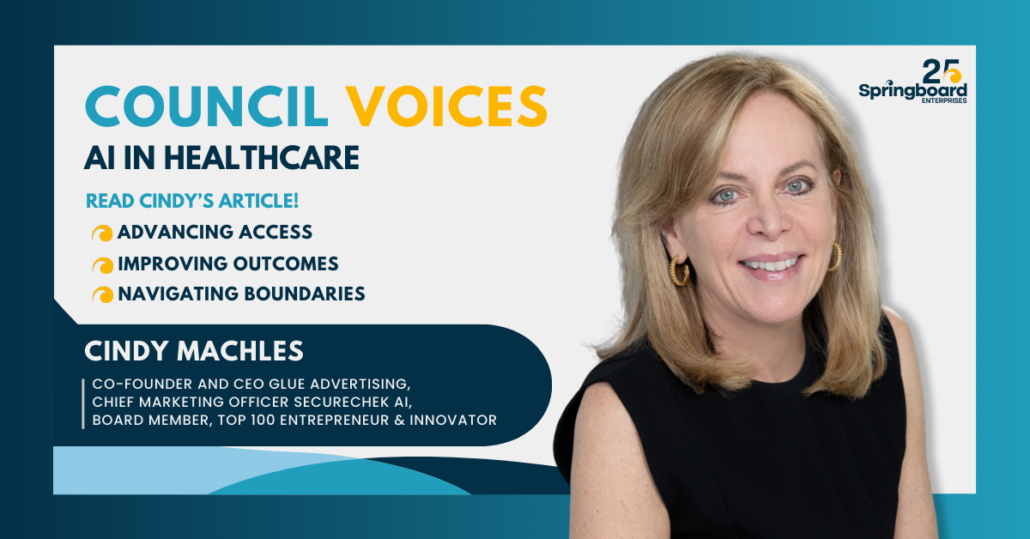
Cindy Machles
AI in Healthcare: Advancing Access, Improving Outcomes, and Navigating Boundaries
Artificial intelligence (AI) is rapidly transforming healthcare, fueling changes that would once have been considered the stuff of science fiction. AI Is not only improving efficiency in administrative tasks and enhancing diagnostic and treatment outcomes, it is reshaping how healthcare is delivered, making it more accessible, efficient, and personalized. And as we’ve seen through the amazing startups currently incubating at Springboard Enterprises, AI is demonstrating tremendous promise in addressing conditions that disproportionately affect women, many of which have historically been overlooked and underfunded.
So, there’s lots of good news to celebrate here. At the same time, evolutions on the horizon mandate that we question the ethical boundaries and proper application of AI before it gets out of hand.
From Administrative Relief to Life-Saving Innovations
A key benefit of AI in healthcare is its ability to automate time-consuming administrative tasks that once commanded a disproportionate amount of healthcare professional time. For example, AI systems are now managing patient scheduling, clinical trial enrollment, and reimbursement submissions; tasks that previously required significant manual input. By automating these functions, AI not only reduces the risk of human error but also frees up physicians, nurses, and their administrative support staff to focus on patient care, which is what we all want.
For women, AI is addressing conditions like breast cancer, cardiovascular disease, autoimmune disorders, and mental health issues, including depression and anxiety, which have historically had an outsized impact on us. In breast cancer detection, for example, AI-driven tools are being used to interpret mammograms, ultrasounds, and biopsies with greater accuracy and speed than humans can, thereby saving lives. For patients who are at elevated risks for cardiovascular disease, AI can predict physiological changes before they become critical, enabling more proactive healthcare management. The same applies to autoimmune disorders, where AI can help forecast flare-ups or complications, allowing for earlier intervention and improved quality of life. And finally, AI can sift through large sets of data from electronic health records and wearables to identify patterns that may indicate the presence of depression and anxiety, where diagnosis and treatment often come later than they should.
Ensuring Privacy and Avoiding Bias
As with anything, AI is not a panacea. Its ability to analyze and classify vast amounts of personal health data could open up a Pandora’s Box of privacy violations if not responsibly managed. Patients must have confidence that their data is secure and that AI tools are being used responsibly, with their well-being as the primary concern. Additionally, AI systems must be trained on diverse datasets to avoid reinforcing existing biases and perpetuating health disparities, especially for underrepresented groups—including women. Another critical issue is the role of human oversight in AI-driven healthcare. While AI can improve diagnostic accuracy and treatment efficiency, it should never replace human judgment entirely. Ensuring that AI remains a supportive tool in the hands of trained professionals will help maintain trust in our healthcare system and guard patient safety.
Striking the Balance Between Innovation and Ethics
AI is significantly enhancing healthcare delivery by improving diagnostics, personalizing treatments, and reducing administrative burdens. Its applications are transforming how conditions like breast cancer, cardiovascular diseases, autoimmune disorders, and mental health issues are diagnosed and managed, providing more accessible and effective care at every stage of a patient’s journey.
But as the role of AI expands, it brings with it a host of ethical challenges that must be addressed. Key concerns include data privacy, biases in AI models, and the need for human oversight. These issues highlight the importance of developing robust frameworks to guide the responsible use of AI technologies.
By implementing thoughtful regulations and ethical guidelines, we can feel confident AI will revolutionize healthcare responsibly and effectively, in a manner that benefits all patients. Sounds a lot like the tenets of the Hippocratic Oath.
Cindy is a pioneering marketing leader with a track record of disrupting industries and building innovative brands. She was one of the first to apply consumer marketing principles to healthcare, later leading global strategy at Grey Healthcare Group and founding Glue Advertising, a top 20 NYC agency. Cindy has since embraced AI’s potential in healthcare, serving as CMO of SecureCHEK AI and advisor to AI-driven ventures. A champion for women entrepreneurs, she mentors startups through Springboard Enterprises and the University of Chicago’s Polsky Center. Cindy holds a BS from Boston University and an MBA from Chicago Booth.



